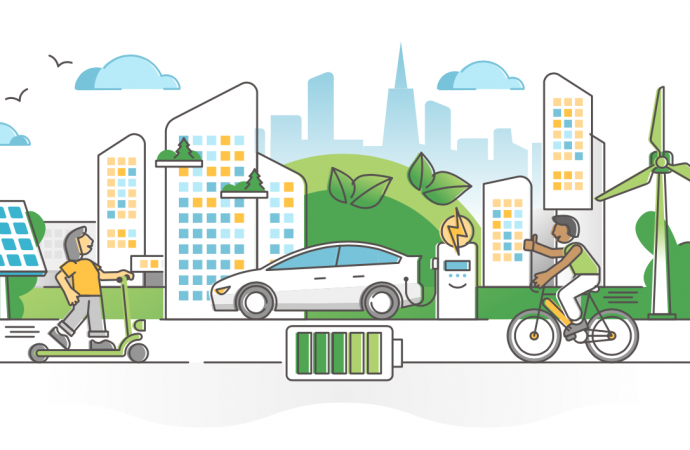As more football clubs make commitments around climate action, reducing the impact of how they move players and fans should be top of the agenda, says Sarah Wilkin
Travel can account for up to 90% of the overall carbon footprint of football clubs and organisations. It’s a significant challenge for the professional game, which is reliant on global travel, with players and spectators hopping from city to city (and country to country) to compete and watch.
A handful of clubs are trying to address this through the provision of car sharing and public transit options. Spanish La Liga club, Real Betis, has carried out a survey for employees and fans, shaping their decision to promote sustainable transport through initiatives such as an electric scooter partnership with Lime.
In the English Premier League, Brighton & Hove Albion is one of many clubs focused on reducing their scope three (third party emissions generated through suppliers or travel) travel footprint by offering free public transport to fans within a designated travel zone.
Fellow Premier League outfit, Arsenal, has established a mobility policy pledging that the club will “endeavour to minimise impacts from travel by reviewing freight and delivery ordering, minimising business travel and encouraging staff to reduce car use by walking, cycling or using public transport”.
Last season’s FA Cup winners also provide cycling provision for staff moving between sites.
At a continental level, UEFA, European football’s governing body, is focusing part of its Football and Social Responsibility work on mobility, particularly at its major events such as its upcoming European Championships in Germany in 2024.
Aleksander Čeferin, UEFA’s president, has committed to avoiding concepts like the multiple-city European Championships, occurring later this year, in the future, and a concerted effort to organise more ‘carbon-friendly’ fixtures. The organisation gave its support to the European Union’s Green Deal proposal last year, and launched its ‘Cleaner air, better game’ campaign around improving air quality – but the increase in the number of teams competing in the Champions League (from 32 to 36) in 2024 raises concerns that travel, and specifically flying, will become more frequent for the competition.
Reducing flight-related emissions is the most complex piece of the sustainable travel puzzle. There’s no way around tackling this issue head-on for football clubs and organisations – particularly those that have made net zero commitments and producing sustainability strategies. There are a few ways in which they can act on this:
– Creating an overarching sustainable travel policy to include more rail, electric vehicles, public transport, car sharing, electric scooters, economy over first-class flying, parking for bikes, and virtual meetings provision
– For event organisers, choosing the best host location, based on where fans and staff are likely to travel from and sustainable travel options
– Consistently measure your scope 1, 2 and 3 carbon emissions – particularly scope 3, in which travel sits – to see how you can improve
– For unavoidable travel emissions, think about investing in legitimate carbon offsets, such as those provided by Gold Standard
– Scrutinise your organisation’s ‘say/do’ gap – i.e. what you say you’re willing to do to fight climate change, and what you’ll actually do
– Keep up to date with the latest news, trends, technology and new ways of thinking around travel by consuming reliable reports and other media
– Join a body like the Fly Green Alliance, which aggregates commitments to buying sustainable fuel, fostering partnerships, building green travel programmes, and managing offtake agreements.
Travel will always be a part of professional football. But by taking concrete steps towards sustainable mobility, the game can continue to please audiences around the globe with a much-reduced footprint. It only takes a bit of commitment and innovation.
Sarah Wilkin is the founder and chief executive of the Fly Green Alliance and a sustainability consultant for TACKLE – a UEFA-supported sustainable football initiative










1 Comment
Alex
August 16, 2021, 5:23 pmHi Sarah,
This article is really great and covers a lot of things I have been thinking about.
I recently launched an instagram page called Pedal to the Pitch, encouraging fans to find sustainable ways to their matches. Check us out!
There is a huge problem in general society, and like most things football is a microcosm that represents the problem. Football however is powerful and changing all the time, fans are responsive, so a great place to lead on initiatives and encourage critical thinking.
Alex
REPLY